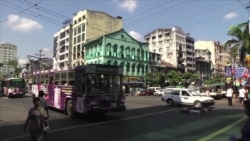Myanmar, also known as Burma, holds national elections in November that could also include a referendum on changing the country's constitution. A statement issued this week by seven embassies - including the United States and European Union - calls for Myanmar to engage all stakeholders long before the vote to ensure a “credible, transparent and inclusive election.”
The United States and other Western countries are “closely watching” how Myanmar's government prepares for upcoming elections, amid what the U.S. Ambassador, Derek Mitchell, called “tremendous challenges.”
“There's no trust in this society at all. Nobody trusts anybody, even each other in civil society. So ensuring there's enough trust in this process [is needed] to come to a result that is acceptable to people," the ambassador said.
The central government's election officials are listening to the concerns of the embassies and trying to be transparent, Ambassador Mitchell said in a phone interview with VOA.
“We have to recognize that voter lists are in very, very bad shape. They have never run an election like this with the standards being very high," he said. "The administration of a nationwide election is very difficult. The infrastructure, whether its roads or even just capacity at local levels, is very low.”
The U.S. Embassy said Washington “supports a broad range of institutional development activities for all political parties to improve their ability to represent the people of Myanmar.” Ambassador Mitchell emphasized the U.S. does not favor any particular party.
Ethnic disputes
Rights activist Matthew Smith of Fortify Rights said there appeared to be no plan to include in this year's electoral process the many ethnic populations living in remote places.
“There's a concern they will be disenfranchised politically in the upcoming elections,” he said.
The country's army has been at war with various ethnic groups for decades - in part a fight over valuable resources.
Ambassador Mitchell said this is another reason adequate advance planning is needed to credibly conduct a nationwide vote.
“There isn't peace in the country. There are issues like Kokang. There are issues like Kachin state, other parts of Shan state, Rakhine state," he noted. "That definitely complicates the inclusive nature, potentially, of the election.”
Most of the Muslim Rohingya in Rakhine state are not citizens. Many have held temporary identification cards allowing them access to government benefits and the right to vote on a constitutional referendum. But their so-called white cards are to be revoked May 31.
Smith, the executive director of Fortify Rights, spoke to VOA from Rakhine state, said this will prevent the minority group for voting in any elections this year.
“So there's a lot of hostility about that decision by the authorities. And most of the Rohingya regard it as the next step in their disenfranchisement or some will regard it as the next step in the destruction of their community,” Smith said.
Ambassador Mitchell, who visits Sittwe in Rakhine state Saturday, said he has been raising the issue of the white cards and the plight of the Rohingya with Myanmar authorities “on a regular basis” and the issues are among the Embassy's top concerns.
Analyst Yan Myo Thein, who was a political prisoner for nearly three years, said he is worried the government will decide not to conduct balloting in troubled areas that are strongholds of the National League for Democracy, the main opposition party.
“In the case of a state of emergency the election can be postponed - not only in the whole country but in some states, some regions in the country,” Yan Myo Thein said.
NLD spokesman Nyan Win told VOA he totally agreed with such concerns.
“We ought to be concerned based on what happened in the 2012 by-elections when," he said, "due to security reasons, authorities did not allow voting in [three] constituencies in Kachin state which the NLD would have won overwhelmingly.”
No boycott plans
Such a scenario might occur again, in the coming election, he warned. But the NLD spokesman said the opposition party has no plan to boycott the election.
He said the party “cannot simply ignore elections because it believes the polls are vital for democracy.” The authorities, he explained, “cannot be expected to hold perfect free and fair elections without any glitches” and the NLD can only expect, at best, such transparency “to a certain extent.”
Analyst Yan Myo Thein has little doubt of the outcome if nationwide balloting is legitimate.
“If the election is free and fair and democratization process is genuine, according to my observation, Aung Sang Suu Kyi can form a government,” explained Yan Myo Thein.
There is another hurdle the NLD leader and Nobel Peace Prize laureate faces, however.
A constitutional clause effectively gives the military veto power over any constitutional changes, including a section that prohibits election of a president whose spouse or children are foreigners. Many believe this was specifically written to prevent Suu Kyi from becoming president.
A number of diplomats, analysts and representatives of rights groups said if there is no progress towards constitutional revision in the coming months that will reveal the government and ruling party are really not serious about further moving Myanmar to democracy.








